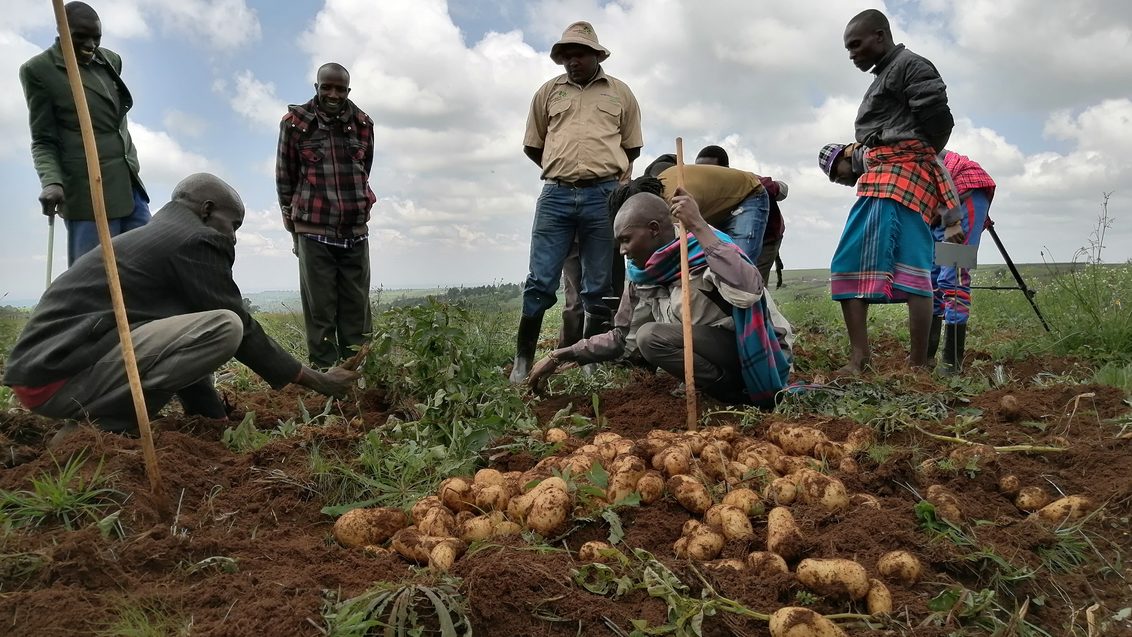Potatoes offer new perspectives for pastoralists

Raising animals is more difficult than ever in much of Kenya. Diversification offers a solution to many farmers’ problems. Our work in Samburu shows the great potential of potatoes.
Pastoralism is an important economic activity in Kenya. About one-fifth of the population practices this form of animal husbandry. It has particularly deep roots in the Maasai, Turkana, Samburu, Pokot, Rendille, and Borana communities. They are spread across vast areas of the country, notably in the savanna and desert regions.
Like their counterparts around the world, Kenyan pastoralists face numerous challenges. These include recurring drought, local economic difficulties, lack of schooling, widespread poverty, poor health, and inadequate nutrition. In Kenya, these problems have been worsened by a recent surge in often violent livestock raiding. Deaths and loss of property contributed to a vicious downward spiral.
The Syngenta Foundation for Sustainable Agriculture (SFSA) is among those helping to improve the situation. Through the PASTTA* section of its Seeds2B program, SFSA is establishing potato production in ecologically suitable pastoral areas such as Samburu. “The initiative aims to strengthen local economic activity and food security by diversifying farming”, declares our PASTTA Deputy Chief of Party, Stacy Mwangala. Work began with trials of six high-yielding potato varieties, Kenya Sherekea, Unica, Sagitta, Dutch Robjin, Voyager and Challenger. “Such trials are important for raising pastoralists’ awareness of arable alternatives, and for demonstrating good agricultural practices”, Stacy explains. (See below).
Capacity-building, County collaboration, and commerce
Capacity-building is a key feature of the Samburu potato initiative. “The program has trained over two hundred farmers, including women and young people. Many of them walk long distances to come and learn”, notes Tony Gathungu, Head of Seeds2B Africa. Close collaboration with the Samburu County government plays an important role in making the initiative a success. “Local administrators are at the forefront of spreading the good news to the community”, Tony adds. “They understand the potato’s potential as a sustainable contribution to solving food security problems.”
The commitment of the PASTTA team also helped farmers change their mindset. “Many pastoralists show great interest in potato farming”, reports Stacy Mwangala. “Some are even willing to replace their livestock husbandry entirely.” The advantages are also visible elsewhere in the agricultural value chain. “Local retailers, especially women, appreciate having a potato source nearby”, Stacy says. “Easier access reduces the time and costs associated with transporting them from other regions. Local potatoes encourage local entrepreneurship!”
The Samburu potato initiative clearly demonstrates that if a community gains access to the right tools, training, and support it can achieve great results. “By producing major food crops such as potatoes or corn, pastoralists can greatly increase their food security”, Tony Gathungu is convinced. “Livelihoods improve, and that should also be good for regional peace and security.”
Future steps include producing more potato seed, as availability is still a major challenge in Samburu. In partnership with the County government, Syngenta Foundation East Africa will also continue to train farmers on good production practices, using on-farm demonstrations through the growing season.
Better practices, better seed access
In partnership with the Samburu County government, SFSA trained over 200 pastoralists on good agricultural practices at Field Days in Seketet and Siambu. The farmers selected Unica and Kenya Sherekea as the potato varieties best suited to their region. Seed availability and accessibility were the main issues raised at the Field Days. To tackle this, the PASTTA team is now identifying suitable local land for seed multiplication, enabling scale-up of production in pastoral areas. SFSA and the County government are also investigating a long-term partnership for potato seed production in Samburu.
See what PASTTA is doing in Uganda, Senegal and Mali (Sénégal et Mali en français également!)
*PASTTA is the Partnership for Seed Technology Transfer in Africa between USAID and the Syngenta Foundation for Sustainable Agriculture. It primarily focuses on transferring seed-related technologies to smallholders, in order to increase their harvests and income.
